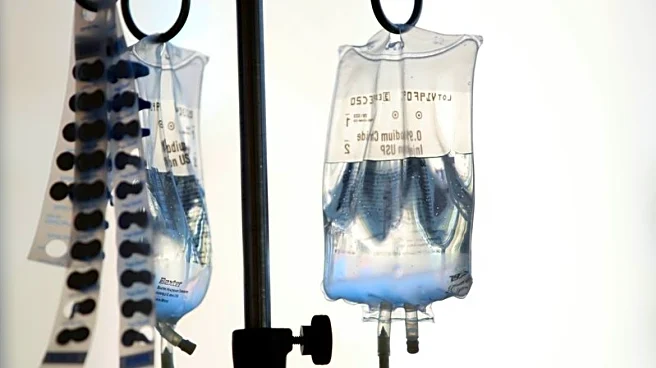What's Happening?
MapLight Therapeutics, a company specializing in neuropsychiatric disorders, has successfully launched its initial public offering (IPO) on the Nasdaq, raising $251 million. The company's shares, trading
under the ticker MPLT, increased by nearly 8% from their initial price of $17. This financial boost was further supported by a private placement with Goldman Sachs, which contributed an additional $8 million. The funds are earmarked for advancing MapLight's lead drug candidate, ML-007C-MA, which is a combination of an M1/M4 muscarinic agonist and a peripherally acting anticholinergic drug. This drug is being developed to treat schizophrenia and Alzheimer's disease psychosis, with phase 2 trials underway. The company aims to differentiate its product from existing treatments by offering better tolerability and the potential for once-daily dosing.
Why It's Important?
The successful IPO of MapLight Therapeutics is significant in the context of a challenging year for biotech IPOs in the U.S. The funds raised will enable the company to advance its drug development programs, potentially offering new treatment options for schizophrenia and Alzheimer's disease psychosis. This is particularly important as current treatments often have undesirable side effects that affect patient adherence. The development of ML-007C-MA could provide a more tolerable alternative, which may improve patient outcomes and adherence. Additionally, the company's focus on neuropsychiatric disorders addresses a critical need in the healthcare sector, potentially impacting the lives of many patients and influencing the market dynamics for psychiatric medications.
What's Next?
MapLight plans to allocate $120 million of the IPO proceeds to the mid-stage schizophrenia trial (ZEPHYR) and $70 million to the Alzheimer's study (VISTA). An additional $25 million will support an ongoing phase 2 study (IRIS) for autism spectrum disorder. The company is also investing $40 million in its preclinical pipeline, which includes drugs for hyperactivity, impulsivity, agitation-related disorders, and Parkinson's disease. As these trials progress, the results will be crucial in determining the future market potential of MapLight's drug candidates. The company's success could encourage further investment in the biotech sector, particularly in neuropsychiatric drug development.










